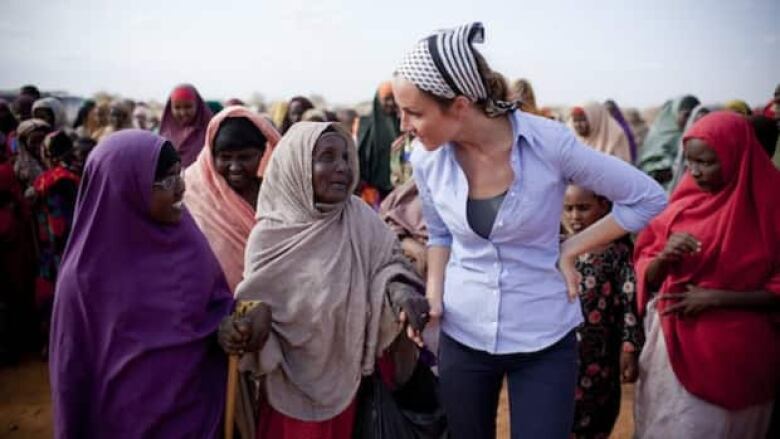Amanda Lindhout talks candidly about abuse while in captivity
WARNING: the following story contains graphic details

Former journalist Amanda Lindhout has spoken for the first time publicly about being sexually abused while being held captive in war-torn Somalia.
Lindhout,who now lives inCanmore, Alta., was in Somalia working as a freelance reporter when shewas kidnappedon Aug. 23, 2008, along with Australian photojournalist Nigel Brennan and their Somali translator and driver.
She hadreported from war zones in Africa, Iraq and Afghanistan in the past, and wrote for a newspaper in Red Deer, Alta.the area where she spent most of her childhood.
Following herrelease in 2009, she went public aboutbeing up shackled and locked in a shed,tortured and beaten by her captors for 15 months but she never talked about the alleged sexual abuseuntil Thursday.
Lindhout attended the One Billion Rising event in Calgary a global event to raise awareness to end violence and told a large crowd she had been raped and tortured.
On Friday, she was a guestonCBC Calgarys radio morning show The Calgary Eyeopener.
Lindhout was asked why she decided to speak about her experience.
"I think I shared in the past an appropriate level of detail with the public, a public who supported me when I was gone in large part through ransom donations to my family are responsible for me being here today, and I know that as a public figure by virtue of being kidnapped I have some responsibility to tell the public yes, in the past I experienced difficult things and I survived and Im home and Im healing.
"But yesterday I wanted to go beyond that and say to a large group of women who have suffered in the same kinds of ways that I have, that yes, I have survived rape and I have survived torture and to show solidarity with the one billion women around the world who have," Lindhout said.
She was also askedwhat exactly happened to her.
"I was kept in chains in a dark room and I was starved and I was raped repeatedly by a group of teenaged boys."
Lindhout also says she doesnt want to be labelled as a victim, but rather as a survivor.
"What happened to me in Somalia doesnt define me. I think that when we put those labels on things it diminishes me somehow, thats not a powerful label to be given that I am a victim. I am a survivor, I have survived rape and I have survived torture and I have survived an extremely difficult 460 days in captivity but Ive moved on from that," Lindhout said, adding she still meets with a therapist and nutritionist regularly as she continues to recover.
Canadian government criticized
Shortly after Lindhouts return to Canada, Liberal MP Dan McTeague, who has lobbied for the release of detained Canadians abroad, criticized what he saw as limited government efforts.
"My preliminary views were that there wasn't enough co-ordination between the Department of Foreign Affairs, Public Safety as they co-ordinated with CSIS and the RCMP," McTeague said. "It doesn't seem there was any ownership of this issue and, therefore, the family was left to, given no option but to, try to fend for itself."
Robert Draper, who was reporting in Somalia for National Geographic when Lindhout and Brennan were taken, said Ottawa failed to do its job. He told CBC News that progress came only when a private firm was hiredto help free Lindhout.
"There was nothing productive or constructive that the Canadian government did that they could at least bring to the family and say, here's where developments are taking place," Draper said.
Return to Kenya
CBC's Curt Petrovich accompanied Lindhout as shetravelled to Kenyafor several weeks in July 2011 to see first-hand the mass flight of starving Somalis into refugee camps. It was a trip partly intended as research for a charity she founded but also a mission to confront her own demons.
It was on her first day in Kenya on a sandy road to a refugee camp in Dadaab, home to many Somali refugees, that the full significance of her return to the region hit her.
"It was on a road just like that that I was taken," said Lindhout. "And the fear that I felt in that initial trip from the compound to the camp was very intense, very intense. It almost took my breath away."
"I don't think I was totally prepared for how hard it was actually going to be for me," she said.












_(720p).jpg)


 OFFICIAL HD MUSIC VIDEO.jpg)
.jpg)



























































































